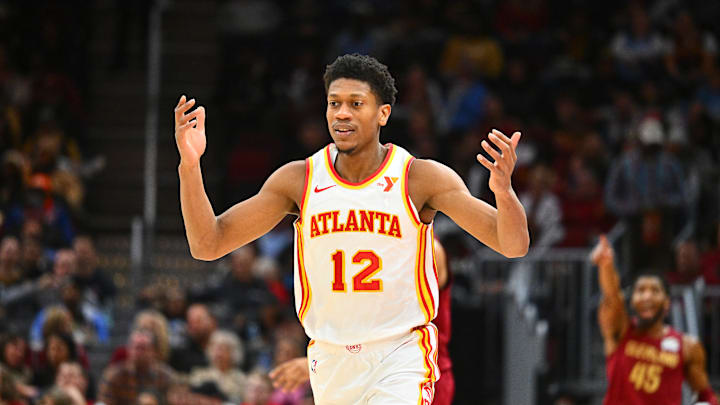The Cleveland Cavaliers brought down the hammer less than two hours before the Trade Deadline, trading for Atlanta Hawks forward De'Andre Hunter.
Despite boasting the best record in the Eastern Conference and a deep and versatile roster of high-level players, the Cavaliers did not rest back and enjoy the vibes of a successful season. Instead, they put their money where their mouth is and made a dynamic, win-now trade to try and address a weakness on the roster and make the team even more lethal come the postseason.
Did they accomplish that task? Was the price worth it? Did they pick the right player? Let's evaluate this trade from all angles and grade the Cavaliers on this massive Trade Deadline swing.
The details of the De'Andre Hunter trade
The Cleveland Cavaliers made a pivot within the last 48 hours before the Trade Deadline to not just pursue quiet moves, but rather to make a big move to add a true difference-maker. Most trades that they were rumored to be considering included players who were not better than the current Cavaliers rotation players, making it unlikely they would provide anything more than depth.
Not so with De'Andre Hunter, a legitimate starter-level small forward. Yet Hunter also didn't come cheap; the Cavaliers had to send solid players and draft capital to the Atlanta Hawks to pull off the trade. Here are the full details of the deal:
The deal is not yet finalized, so a third team could be pulled in to take Georges Niang or another small contract from the Atlanta Hawks. From the Cleveland standpoint, however, this is the total of their incoming and outgoing assets.
The Hawks are well-compensated for a player who doesn't have an obvious fit in their long-term plans. With Jalen Johnson and Zaccharie Risacher the forwards of the future, and the Hawks currently in a freefall down the standings that suggests they shouldn't try to maximize winning in the present, it made sense for them to move on from Hunter.
In return they get the expiring contract of Caris LeVert, a player they could potentially flip to another team either now or as a sign-and-trade this summer. Niang is reunited with former head coach Quin Snyder, who first developed Niang when both were with the Utah Jazz. Atlanta gets a trio of second-round picks and two first-round swaps for their troubles.
Grading the Trade for the Cavaliers
The Cavaliers accomplish a couple of key things with this trade.
First, they do in fact get out of the luxury tax. Rather than turn a valuable player into a worse one to save money, Cleveland manages to get better and duck the tax. That saves the team a significant amount of money in the present and resets the clock on the repeater tax. Given that the Cavs are going to be very expensive moving forward, this deal makes it more palatable to pay for an expensive team down the road.
Secondly, the Cavaliers address what most thought was their biggest weakness, a defensively-capable forward. They ostensibly have that type of player in Dean Wade, but he is both better suited for strictly larger forwards and frequently injured. Hunter is a more versatile defender on the perimeter and a very consistent offensive player.
His improved shooting this season -- more accurate and on a higher volume -- will fit right in with a Cleveland offensive attack that is absolutely destroying opponents. They are the best shooting team in the league this year and if Hunter can continue bombing away in Cleveland he will only further augment their strength.
The cost matters here, of course. Caris LeVert has been a consummate teammate since joining the Cavaliers and has blossomed as a role player, becoming exactly what the team needed. It is very possible this deal lowers Cleveland's floor if one of Darius Garland or Donovan Mitchell misses time, as LeVert has always blossomed in relief. At the same time, this raises their ceiling if everyone is healthy, which is the exact priority you want for a true title contender.
Georges Niang was a decent bench player for the Cavaliers this season, but he was never going to be in their playoff rotation and has money next season that the Cavs will not miss. He is easily replaced by minutes for Hunter at the 4 or by Dean Wade when healthy.
What's more, the Cavaliers kept the powder dry for another trade this offseason or next year to continue supporting a contender. They still own their 2031 first-round pick and Jaylon Tyson, a promising rookie who can either be used in a trade or developed as a long-term piece.
This deal was undeniably less expensive than pursuing Cameron Johnson and arguably brings a better fit in Hunter. He is also more of a difference-maker than someone like Simone Fontecchio or Royce O'Neale. There was no indication Andrew Wiggins was flippable from the Heat. This seems like the best two-way option they could have found.
The Cavaliers didn't break the bank, they addressed a real need on their roster, and they got less expensive and out of the luxury tax entirely. A move like this for a true championship contender is rare, but this deal checks every box.
This deal gets a straight A, and it's exaclty the type of bold move that Koby Altman should be applauded for.
Grade: A
